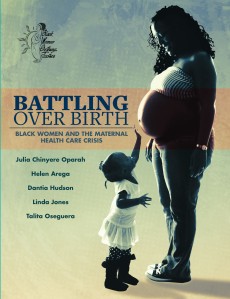Adapting mobile technology to create an app to promote breastfeeding among low-income African-American families.

Excerpt from Smith, P.H., Labbok, M., & Chambers, B. (Eds.) (2017). Breastfeeding, Social Justice, and Equity. Amarillo, TX: Praeclarus Press.
In the United States, African-American women are significantly less likely to breastfeed, and more likely to report barriers to breastfeeding, than their White or Hispanic counterparts (U.S. Department of Health and Human Services, 2011; McCann et al., 2007). Moreover, they often do not receive the necessary support to start or maintain exclusive breastfeeding habits (Evans et al., 2011). In addition, North Carolina has lower breastfeeding rates than the national average, which supports the need for additional breastfeeding interventions in the state (Gazmararian et al., 2014).
Mobile health (mhealth) interventions have potential to address factors that contribute to breastfeeding disparities. Recent studies found that among smartphone owners, 19% had mobile applications (apps) that tracked or managed their health, and African-Americans were more likely than others to use their phones to look for health information (Baker et al., 2003; Fox et al., 2012; Ohlendorf et al., 2012; Shieh et al., 2009). An mhealth app specifically tailored for low-income African-American families has potential to support breastfeeding and reduce negative physical health outcomes (Tirado, 2011).
This paper describes an adaptation to an existing app in order to create one that promotes breastfeeding, and which is tailored to the needs of low-income African-American families. The researchers involved in this project were part of a Capstone team in the Department of Health Behavior at the University of North Carolina, Chapel Hill. Capstone is a year-long project in which second year Public Health Masters’ students work with an organization, to solve an identified community need. The Capstone team (the team) consisted of four student researchers and two faculty advisors who were paired with IntraHealth International, and were tasked with adapting mSakhi, a mobile app from India, to an American context.
MSakhi Breastfeeding Mobile Application
 MSakhi was originally developed to promote maternal and child health in India, and is currently used by community health workers (CHWs) to collect and store data, as well as to supplement health lessons that are traditionally verbally delivered with pictures, audio, and videos. MSakhi, whose content was developed for a cross-cultural population with low literacy, has one end user, the CHW. The structure of mSakhi was readily adaptable as it can collect and store health data, provide responsive curriculum while tracking and end user progress, and be used with low-literacy audiences. The team’s proposed adaptation of mSakhi aims to increase breastfeeding among low-income African-American women by increasing knowledge and self-efficacy, and strengthening peer networks.
MSakhi was originally developed to promote maternal and child health in India, and is currently used by community health workers (CHWs) to collect and store data, as well as to supplement health lessons that are traditionally verbally delivered with pictures, audio, and videos. MSakhi, whose content was developed for a cross-cultural population with low literacy, has one end user, the CHW. The structure of mSakhi was readily adaptable as it can collect and store health data, provide responsive curriculum while tracking and end user progress, and be used with low-literacy audiences. The team’s proposed adaptation of mSakhi aims to increase breastfeeding among low-income African-American women by increasing knowledge and self-efficacy, and strengthening peer networks.
Method
In order to determine the potential scope of the app and understand common barriers to breastfeeding, the team looked at peer reviewed literature on breastfeeding interventions for low-income African-American women to inform the design of interview guides for primary data collection.
Interviews were conducted over a 7-month period. The goals of the interviews were to:
- gain the opinions of experts regarding the local relevancy of breastfeeding barriers identified in the literature
- understand the personal histories of potential end users
- identify intended end users of the app
- identify potential features of the adapted app
Two interviews were completed with Women, Infants, and Children (WIC) program participants. Sixteen interviews were completed with breastfeeding researchers and experts. Experts and researchers were identified by online research, recommendations from UNC Gillings School of Global Public Health faculty, and by snowball sampling. Interviews were transcribed, coded, and analyzed to identify overarching themes.
Additional publicly available data for analysis came from the Facebook group Black Women Do Breastfeed (BWDBF) consisting of posts by the page moderator and comments on those posts from Facebook users. Posts typically included a question submitted to the moderator by a Facebook user about breastfeeding, or an encouraging statement accompanied by a photo of the Facebook user breastfeeding.
Themes from the interviews and Facebook data analyses were compared and combined to create a list of possible tailored features for the adapted mSakhi app to address the needs of low-income African-American women. The team then created a summary of functional gaps for reconciliation by mSakhi’s developers.
Results
Literature review results revealed that interventions designed to improve breastfeeding often applied the construct of self-efficacy from the Health Belief Model, as well as concepts from Social Support Theory. Several interventions were identified in the literature review that met one of these criteria: 1) targeted increased breastfeeding as the intended outcome, 2) used a mobile application to deliver the intervention, 3) focused on African-American women, or 4) focused on low-income women. However, no interventions were found that used mobile applications to increase breastfeeding specifically among low-income African-American women.

Three major topics were identified that could be addressed by a mobile app:
- lack of social support
- low self-efficacy to breastfeed
- lack of informational support
Formative research also identified resources that low-income breastfeeding mothers used, which were not represented in the current literature, including online forums, such as the BWDBF Facebook page, as well as growth and development apps, such as What to Expect When You’re Expecting. The following comment on the BWDBF page was typical of many of the encouraging posts on the page:
This is my 3-week-old daughter that I’ve been breastfeeding since birth. This last week I’ve had to switch to combination bottle-feeding because her mouth is too small, and she isn’t latched well. If it wasn’t for finding this page, I would have quit breastfeeding all together. All of the tips and pictures are pure motivation for me! I tried to breastfeed my three-year-old, but he wouldn’t latch when he was born, and it was so frustrating I gave up his first week home. This time I am thankful to make it 3 weeks, even if it is combination, thank you for having such a wonderful page!
–Data from BWDBF Facebook page
Data from interviews with breastfeeding experts confirmed some of the barriers identified in the literature among low-income African-American women. These barriers included environmental factors, such as a need to return to work, and lack of appropriate breastfeeding or pumping facilities available at workplaces, as well as social factors, such as a lack of support, lack of breastfeeding role models, and stigma. One expert spoke to the importance of social support within mothers’ peer networks:
We’re constantly bombarded by experts telling us the things we should do. And the chances of us doing some of those things are extremely small, especially if we don’t see those things fitting into our current lifestyle. When we have people who are our peers, or are in our social network, when they say ‘This is what I’m doing, you should do this,’ usually it’s followed up with, ‘and this is how I do it, in my world.’ And because they’re part of our social network, chances are that we have some sort of connection with them that makes us somewhat similar to us … You know I think it’s just a different kind of credibility when it comes from someone in your network versus the doctor or the nurse, who you obviously don’t see very often, tells you should do that.
–Participant 6, Breastfeeding interventionist

Social support was indicated in data analysis as a major influence on breastfeeding behavior and acceptance. In particular, informants mentioned the influence of their babies’ fathers on the decision to breastfeed. Another important social factor was having another woman in the family, or within a mother’s close group of friends, who had breastfed or was currently breastfeeding. One mother also described social support she received through photos of African-American women breastfeeding on social media:
I love seeing those pictures. I mean, the babies are always so cute. And just knowing that I am not the only Black breastfeeding mother, and you know not having to cover up and hide yourself, feeling ashamed. Or that your family may not be encouraging you or be supportive of you … well we can be a network that is supportive of each other. And those pictures kind of help other people see we are moms too. We breastfeed too. It’s not just a certain type of people that do that.
–Participant 1, mother and WIC participant
Limitations
Due to time constraints and the difficulty of recruiting in the target population, the voices of low-income African-American women in North Carolina are underrepresented in this report. The team addressed this shortcoming by collecting women’s voices from the BWDBF Facebook page and from experts who work closely with this community. Although the page is national, and not specifically low-income, it informed our understanding of general challenges to breastfeeding that African-American women face.
Discussion
Preliminary formative research with breastfeeding experts supported the importance of focusing on social support as a key theoretical construct for increasing breastfeeding. This was reinforced by subsequent research with low-income African-American mothers (interviews and Facebook data), interviews with breastfeeding experts, and contacts at the Breastfeeding and Feminism International Conference. In an effort to increase social support, the team recommended that the adapted version of the mSakhi app have multiple end users, including mother, grandmother, father, partner, and friend. Engaging these multiple end users may increase support for and knowledge of breastfeeding practices within the mother’s social circle (see Figure 1 [in the book] for a guide to the features of the adapted app).
The team also recommended that the app contain a forum, where mothers can post questions to other users. Forums should be specific to the end user, so that mothers can communicate with other mothers, fathers with other fathers, and so on. Research by Mwamba (2015) and Spencer (2015) reinforced the need for specific and tailored communication channels for breastfeeding supporters within a mothers’ network. The goal of the forum would be to engage those supporters in a solution-oriented dialogue with one another.
The near ubiquity of mobile technologies provides a unique platform to deliver behavioral interventions via a familiar medium. A breastfeeding support app has the potential to have a significant positive health impact among low-income African-American mothers and their families. Adapting an existing app for this purpose saves on development costs, and models the types of creative cross-cultural, cross-health topic solutions that are needed amidst continued budget constraints and increasingly complex technologies.
Anise Gold-Watts, Jennifer Lawall, Marielle Matthews, and Jewels Rhode graduated from the MPH program at the University of North Carolina’s Gillings School of Global Public Health in May of 2015. In lieu of a Master’s thesis, they were involved in a Capstone project with IntraHealth International guided by Girdhari Bora (ICT Advisor), Dr. David Potenziani (Senior Informatics Advisor), Dykki Settle (HRIS Leader), and Dr. Kathryn Muessig (Assistant Professor, UNC Gillings).
Ms. Gold-Watts’ research interests center on strategies that integrate traditional culture and evidence-based public health practices in developing countries. Ms. Lawall focuses on behavioral components of vaccine and infectious disease epidemiology. Ms. Matthews is passionate about rural health and equitable access to health services. Finally, Ms. Rhode is interested in chronic disease prevention and management and eliminating racial/ethnic health disparities. In this Capstone project, these students focused on mitigating barriers to breastfeeding among low-income African-American women through mobile health.






















Leave a comment